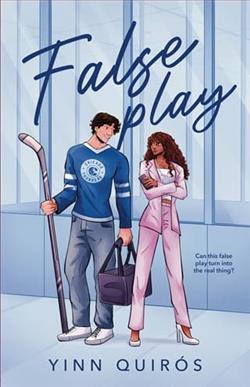Page 49 of War of the Wedding Wagers
Not that she’d actually come to him since he’d just stepped into the room.
“Let me draw you up a chair beside this one, and you can tell me all about it,” he invited, making sure the chair was as close as it could get.
She didn’t seem to notice. “You see, Sir Frederick, I realized that the letter that I had assumed Caroline had received from Mr. Greene was written, in fact, a hundred years earlier.” She withdrew a thick piece of paper from her lap and waved it infront of his face. “It’s been very well preserved, but I should have taken note before I was so quick to run to you with tales about her so-called scandalous behavior. She must hate me now!”
“Caroline is quick to forgive. You only need to explain it to her,” Sir Frederick said, smiling. He liked the proximity. Miss Fairchild was delightfully earnest. He wasn’t used to that in a woman. His flirtatious banter with Mrs. Perry this evening had been wearyingly familiar. The same old playbook. Both of them knew the code and played by the rules.
Once Miss Fairchild had left, he had little choice but to succumb when Mrs. Perry had fluttered her eyelashes above her fan. And then there’d been the small talk, laden with innuendo.
What he had made sure of this evening, though, was that she could be under no illusion he was open to more than a dalliance. She’d have left her slippers in the passage outside her door if he’d given her the smallest bit of encouragement.
With Miss Fairchild playing so much on his thoughts, he was not about to do that.
And now here was Miss Fairchild, who had appeared, as if on cue, like an answer to his dreams.
“Indeed, I shall,” Miss Fairchild was saying. “I shall show her the letter. In fact, all of them. Oh, Sir Frederick, it’s quite tragic. There’s a treasure trove here. The young people obviously used an old brick in the wall that could move as their letter box. I don’t know why they are all there, but I suspect it was safer not to keep them in their respective bedchambers, don’t you think? Because of the family’s opposition,” she clarified.
Sir Frederick nodded as he took the letters she handed him.
“Fascinating, don’t you think?” she asked again.
“Fascinating,” he agreed. But she was the one he found fascinating. When she was animated, her cheeks became flushed and her eyes sparkled. In the warm glow of the room, he thought he’d never seen any woman more beautiful.
He tried to equate her with the Puritan he’d taken such pains to persuade himself out of admiring earlier.
“Just read the words young William writes to her. It quite makes my heart break.”
Sir Frederick nodded. Then he frowned. “I’m curious as to why you should be so affected, though, Miss Fairchild, when you are the first to decry sentimental bunkum.”
Her rosebud lips parted and for a moment, he thought she would respond with indignation. Then she said thoughtfully, “I decry sentimentality for its own sake. And when it’s used to manipulate people into thinking something is heartfelt and touching when it isn’t. Like in a badly written book. Do you not think that the feelings of the heart should be pure and noble, Sir Frederick?”
It was clear she wasn’t filtering her words; she was far too excited by these love letters. Sir Frederick enjoyed listening to her and watching the emotions flit across her features.
“Have you received love letters like these?” he asked and then wished he hadn’t, for the question seemed to shock her and immediately she was self-conscious once more.
“Of course, Thomas wrote to me,” she said stiffly, holding the letters in her lap, almost protectively.
“But did he use the language of a lover? Clearly the young William from these letters was either clever at manufacturing the kind of sentiment he knew would win over Miss Pernilla. He knew her family was deeply opposed to a match between them. He knew he was beneath her.” He shrugged. “Or maybe he really was a man who felt deeply and everything he says was, indeed, straight from the heart.”
“Oh, that’s a terrible thing to say, Sir Frederick. You suggest that there could be a calculating aspect to these letters?” She waved one of them in front of him. “How could he make upsomething like this if he didn’t feel deeply.” Holding it up so she could see, she began to read,
“My dearest, most cherished Pernilla,
Though I may not possess grand estates or noble titles, I swear to you that my love and devotion will provide a life richer than any fortune could buy. Trust in me, and I will work tirelessly to ensure your every comfort and happiness. Our home may be modest, but it will overflow with laughter, warmth, and the unshakeable bond of true affection—”
She glanced up. “Lady Pendleton claims he was a stable boy and that the letters I found suggesting otherwise were false. But this letter really is more than a hundred years old. It’s real. And those are not the words of a stable boy.”
Sir Frederick smiled. “He may have had someone else write it. Regardless, he was not a young man the family approved of.” He patted her hand. “I think it charming that you have taken up their cause, but do remember that these star-crossed lovers are long dead. Do you suppose that enlightening Lady Pendleton will soften her stony heart?”
“You think she has a stony heart, too?” Miss Fairchild dropped the letters into her lap and clasped her hands together. “I thought I was the only one, for she does pretend to be most charming. And yet, have you heard the way she speaks to Lady Townsend who, I believe, has been her friend for more than thirty years?”
Frederick felt a surge of unexpected affection for the young woman beside him. Of course, it was irregular that they should be conversing, alone, in the middle of the night. And he’d written her off earlier as unapproachable, though in truth his opinion of her wavered all over the place. But now that she’d warmedto her theme, which was really quite a sentimental one, she was quite natural and unfiltered. Dropping his guard, he told her so, adding with another fond smile, “You obviously have less of a stony heart than I had believed, Miss Fairchild.”
And then he immediately recognized his mistake.
“Sentimental?” she repeated, moving away from his hand which rested over the armrest and was quite close, though not touching, as she retreated into the depths of her chair. “Thomas deplored those who were sentimental. He saw intense emotions as a distraction from spiritual devotion and rational contemplation of God’s will and said it was opposed to logical thinking.”
Sir Frederick nodded. “So, that is what your Thomas thought. But what do you think?”















